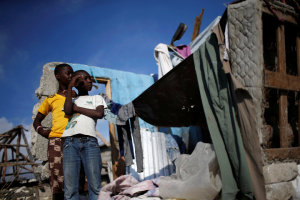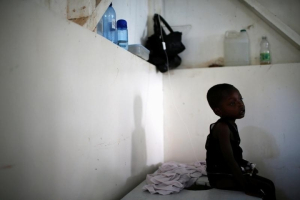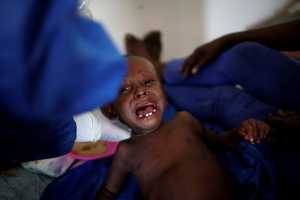MAP International, a nonprofit health and relief organization that partners with people living in poverty to save lives and develop healthier families and communities, is working tirelessly to help thousands battling cholera in Haiti, a preventable and treatable disease.
Steve Stirling, CEO of MAP International, told The Gospel Herald in a phone interview that in the wake of Hurricane Matthew, Haiti is devastated; more than 1,000 people have died in just 10 days and more than a million are vulnerable to cholera. In fact, the ongoing Haiti cholera outbreak is the worst epidemic of cholera in recent history, according to the U.S. Centers for Disease Control and Prevention.
However, the devastation Hurricane Matthew left behind has received little coverage thanks to the current U.S. presidential election.
"I think what most people don't realize is the magnitude of the devastation," Stirling told GH. "When you actually see the impact, it's much greater than people think. Unfortunately, Americans are currently distracted from what's going on around the world."

A child receives treatment at the cholera treatment center at the hospital after Hurricane Matthew hit Jeremie, Haiti,
To counter this epidemic, the Christian health organization driven by Matthew 25:36 is sending six truckloads of medicine and supplies in partnership with 410 Bridge to Haiti.
The shipping has been donated by UPS Foundation, and with approximately $27 million in medicine and supplies that will provide about 200,000 treatments, Stirling hopes it is enough to help curb the crisis.
"Cholera is treatable, but the medications simply aren't readily available in Haiti," he told GH. "We're sending antibiotics - a huge need, and hospital supplies like wound dressings, bandages, and gloves. We're also sending medications we take for granted in the America, like diabetes and hypertension medicines, and multivitamins and vitamins to help the children."
He added, "Oftentimes the number one killer of babies under the age of five is diarrhea because of poor conditions and contaminated water. You need antibiotics to cure them of the diarrhea."
The organization, which has responded to natural disasters worldwide for more than 60 years with vital medicines and relief supplies, has seen its work pay off on many occasions. Stirling shared how, during a visit to Haiti two years ago, he encountered two little girls - one who had cholera, one who had pneumonia.
"These two little girls wouldn't have survived had they not had antibiotics or solutions, but thanks to our organization, they were cured of their diseases," he said. "Had they not had the medicines and the care, they wouldn't have made it. It was heartwarming to see these little girls whose lives were saved because of the medicines they are getting thanks to MAP International."

A child is being treated at the cholera treatment center at the hospital after Hurricane Matthew passes in Jeremie, Haiti, October 9, 2016.
Stirling's passion for helping other stems from his own experience: As a child living in South Korea, he contracted polio - a crippling and potentially deadly infectious disease easily prevented by a simple vaccine. However, due to the lack of access to medicine, Stirling was left disabled, and abandoned at an orphanage at just five years old. Thankfully, he was adopted at the age of ten, and has allowed his personal tragedy to inspire his work today.
"I believe God allowed me to get polio for a purpose, and that's why I'm so passionate about getting life saving medicines to people in need around the world," he explained. "An antibiotic is an example of a life-saving medicine, because it can save a life, or a limb - I met a girl who lost her leg because she stepped on a nail but the antibiotics to counter the infection weren't available."
Stirling is urging Americans to help those who are sending aid to Haiti by giving monetary gifts and praying for those responding to the crisis on the ground. He noted that every dollar donated to MAP International is effectively multiplied 60 times in the value of medicine provided to those who need it most.
"Even a $10 donation will ship $600 worth of medicine - medicines are, for the most part, donated, but we do buy about a million dollar worth of medicines ourselves," he said. "Of course, prayer is very important, the people of Haiti need our prayer."
He continued: "We help all people regardless of their ethnicity and religious beliefs. We welcome people to join us, and ask them to donate whatever they can so we can help those in need."
To learn more, visit http://www.map.org/



















